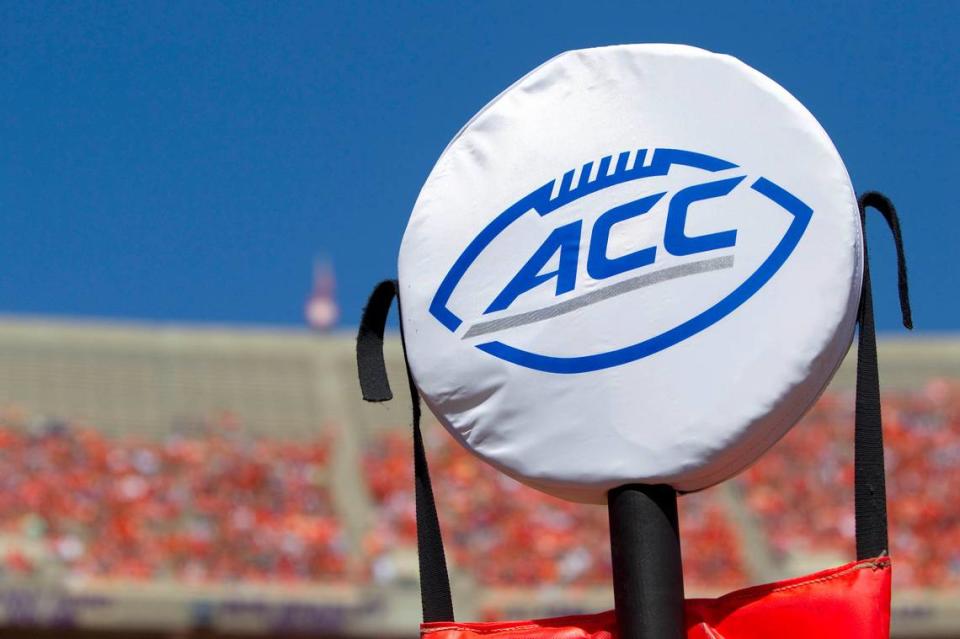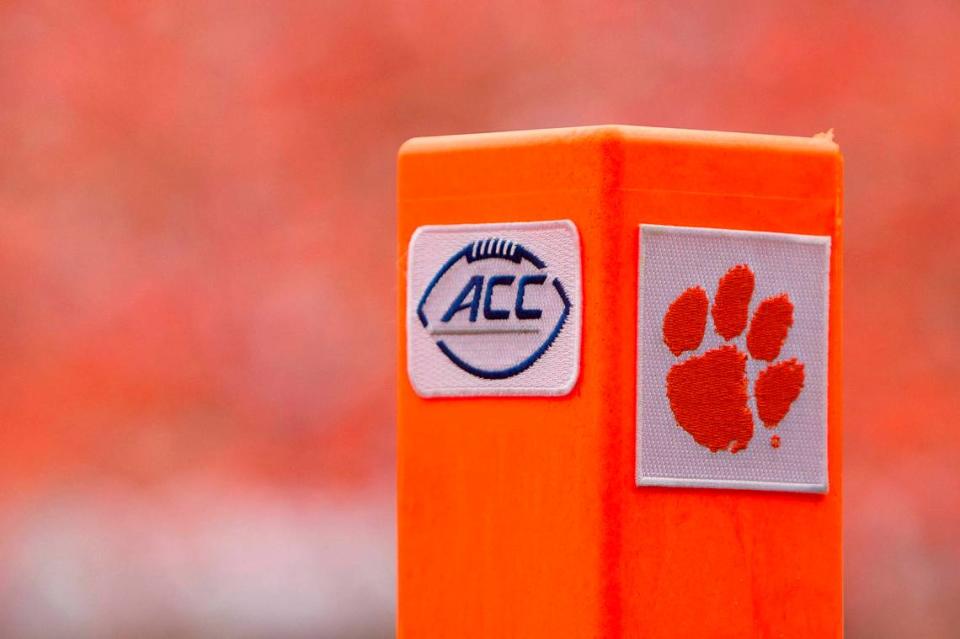Can Clemson actually win its lawsuit against ACC? What legal experts say
On March 19, Clemson took the historic and dramatic step of suing the Atlantic Coast Conference over its strict “grant of rights” agreement and an “exorbitant” exit fee.
For Clemson, a founding member of the ACC that has competed in the conference for 71 years, it was a clear indication the school wants a new, more financially lucrative conference for its powerful football program and the rest of its sports.
The Tigers are specifically taking aim at the ACC’s grant of rights, a legal document that binds them to the conference through 2036.
If a school were to leave the ACC under that agreement, it would owe the conference roughly $140 million and forfeit its media rights (the revenue generated from televising its home games) to the conference through 2036 as well.
The total cost of departure has been estimated at $572 million.
Clemson is suing the ACC in an attempt to reduce or completely eliminate that cost, which would clear the way for the university to accept a potential invitation from another conference (such as the SEC or the Big Ten) in the coming years.
Nearly three months later, how are things progressing?
The short answer: slowly. One day after Clemson filed the suit, the ACC filed a countersuit against the university — and there have been almost weekly filings, amendments and/or motions in both cases, by both sides, ever since.
As the cases roll on, The State checked in with three lawyers who aren’t connected to the case but have been following it closely to answer a number of frequently asked questions, including the big one: Who ends up winning?

What’s the current status of Clemson’s lawsuit?
As of this week, the Clemson vs. the ACC lawsuit in Pickens County, South Carolina and the ACC vs. Clemson in Mecklenburg County, Charlotte (where the conference’s Charlotte headquarters are located) remain active and ongoing.
After filing its original lawsuit March 19 in South Carolina, Clemson filed an amended complaint against the ACC on April 17, which is a standard move.
The amended complaint was longer with more pointed language and added a new “slander of title” allegation to its original requests for a court to rule the ACC’s “exorbitant” $140 million exit fee unenforceable; and to rule that Clemson’s media rights granted to the ACC via contract would not apply to any home games if and when they exit the league (a move that would require another league’s invitation).
The ACC has filed a motion to dismiss that case in South Carolina, and Clemson, in turn, has filed a motion to dismiss the ACC’s case against it in North Carolina.
A July 2 “case management conference” in Mecklenburg County Court, ordered in May by the North Carolina judge presiding over the case, is the next major event on the docket and will be a critical step on where the case will be heard.
Clemson on May 31 also filed a motion in Pickens County court requesting a summary judgment — essentially, a pretrial ruling on the facts at hand by the court — that could potentially speed up the case and produce a quicker ruling.
The university requested a summary judgment hearing on or by July 12.
It’s to be determined if that motion gets granted, though.

Where will the case be heard?
In his experience, New York-based corporate lawyer Irwin A. Kishner said the issue of venue is “usually settled pretty quickly up front” since most contracts specifically say (or make very clear) where any potential lawsuits should happen.
David McKenzie, an intellectual property lawyer based in North Carolina, agrees. The Clemson-ACC lawsuit, he predicted in an interview, “ultimately will go to Charlotte.” There’s indeed a legal concept called the “first to file” rule that can grant perceived home-field advantage to the first party, but that’s only one factor.
“It’s more likely, especially in a contract situation, you’d want to look at where all the common nucleus of facts, as we say in the law, reside — and that is unequivocally North Carolina,” McKenzie said of the grant of rights agreement that ACC schools signed in 2013 and re-signed in 2016. “The negotiations, the discussion, the signatures, all of that happened in North Carolina.”
Clemson, in its amended lawsuit, has laid out an argument of sovereign immunity: The precedent that a state or one of its agencies or “arms” can only be sued in that state. But McKenzie said sovereign immunity is “never applied in contract cases.”
After Maryland announced it was leaving the ACC for the Big Ten in 2012, the university and the ACC sued each other in parallel cases regarding exit fees.
A Maryland judge ultimately halted those proceedings and deferred to North Carolina court to resolve the case. And Florida State’s parallel lawsuit against the ACC (filed in December 2023) appears to be headed to North Carolina, too.
“I think that’ll apply to Clemson as well,” McKenzie said.

Can Clemson break the grant of rights?
Although Clemson’s lawsuit was tighter and more direct in its wording than Florida State’s, lawyers still foresee a tough legal battle ahead for the Tigers.
In challenging the ACC’s grant of rights, Clemson made the distinction that it’s not seeking a complete nullification of the contract, only a declaration from a court that “the media rights Clemson granted to the ACC did not include any Clemson games that are played after Clemson ceases to be a member of the ACC.”
But to McKenzie, that request still more or less amounts to a “complete rescission” of the grant of rights Clemson initially signed and later re-signed — which, he emphasized, is a “challenging position” for any court to rule favorably toward.
In contract disputes, McKenzie said, a court’s No. 1 task is determining the intent of the parties at the time of signing. A court can indeed completely undo a contract, but that’s limited to “extreme” cases of fraud and duress — essentially, one party engaging in something illegal or pushing through a deal that’s “egregiously unfair” — or a lack of “sophistication” among parties agreeing to a contract.
There’s an infamous example taught in law school, McKenzie said, in which an 81-year-old woman with poor vision signed a contract to pay $35,000 for 15 one-hour dance lessons. That, a court ruled, was a valid case of an unreasonable deal.
In legal terms, it’s called “substantive unconscionability.”
“I don’t think I’ve ever heard a premier athletic program saying substantive unconscionability after getting hundreds of millions of dollars from an agreement,” he said. “It may be a bad deal, but it certainly doesn’t render it unconscionable.”
Kishner added that Clemson also has a weak argument when it comes to “procedural unconscionability,” another contract defense that focuses on the “sophistication” of the parties at the time of signing. (In this case, that would be the ACC’s leadership in 2013 and Clemson’s leadership in 2013.)
Essentially: Was one party far more knowledgeable and educated than the other?
Clemson’s president at the time of the original grant of rights was James F. Barker, a well-regarded leader and former dean of architecture at the school. He signed the ACC’s agreement with the support of university leadership, including then-athletic director Dan Radakovich, and the school’s legal counsel. Given those details, Kishner and McKenzie see the “sophistication” argument as a no-go.
“You can make a credible argument that both sides were represented by very sophisticated legal advisors,” Kishner said. “You would’ve thought the issue would’ve been studied to a certain extent, right? Ultimately, I think it’s a tough battle to wage.”

What about a damages claim?
Ashwini Jayaratnam, a New York-based business litigation lawyer, has argued that the path forward for Florida State and Clemson could be through a damages claim: The idea that the ACC’s total withdrawal penalty (ballparked at $572 million per school, when you include media rights through 2036) is meant to dissuade breaking the contract, as opposed to the actual damages the ACC would incur from a school leaving.
Jayaratnam argued that zeroing in on the actual “price” of, say, Clemson departing the ACC could be a more feasible path toward the school’s ultimate goal — a smaller exit fee, or no exit fee at all — as opposed to challenging the grant of rights contract.
“It could be that a court says, ‘There’s no way it’s $570 million to leave,’” Jayaratnam told The State in January. “But the court could say, ‘But it is $130 million,’ which I think (schools) would be willing to pay.”
The ACC, she wrote in a May 9 legal analysis covering both the Clemson and FSU cases, has argued that framing its exit fee as a penalty is “improper” because the fee is not triggered by a breach of contract (a requirement for a damages provision).
The conference has instead claimed that, under North Carolina law, its total exit fee is an “alternative means” for a school to perform its obligations under the grant of rights.
As Jayaratnam points out, though, that’s at odds with ACC’s own constitution. That document specifically refers to the exit fee as a form of “liquidated damages.”
“Aware of this, the ACC argues that labels aside, the fee, in substance, operates as an alternative means of performance,” Jayaratnam wrote.
Added Kishner: “It’s a very fact-specific case, and you certainly can make a credible argument (in Clemson’s favor), which is: This is without a rational relationship to the damages one suffers, and therefore it is a penalty and is not valid.”
McKenzie, though, cautions that such an argument could end up further benefiting the ACC, which he already sees as having a clear legal upper hand.
A full analysis and accounting of actual damages could solidify or even boost the ACC’s current exit fee, given how lucrative college football media rights have become (the most recent SEC-ESPN deal was valued at $3 billion).
“I think from the ACC perspective, you’d have to ask yourself, ‘What’s the value of these media rights going forward for us to 2036?’” he said. “And then, ‘What’s the diminution of value to the entire conference as a result of Clemson’s departure?’”
“That can be an astronomical number.”

So … does Clemson win the case?
Here’s where legal opinions vary dramatically.
Kishner usually refrains from predictions since every case in his field of sports media law is unique and fact-specific. In an initial review of the Clemson vs. ACC case, though, he said it’s a bit of a “coin flip.” If he had to pick a side? It’s the ACC.
“I think my emotion says: ‘You did sign a deal, and you did have sophisticated parties,’” Kishner said of Clemson. “Now, were you duped? Were you misled during the process? If there’s evidence of that, I’d feel differently.”
Jayaratnam, in her legal analyses, has been more optimistic about Florida State and Clemson’s chances of winning their cases — or at least “winning” their argument specific to actual damages, as outlined earlier.
“Clemson’s lawsuit provides an avenue through which the North Carolina court could uphold the Grant of Rights, yet avoid the significant revenue forfeiture to members upon exit,” Jayaratnam wrote, referencing Clemson’s argument that the ACC’s grant of rights wouldn’t apply to home games played post-ACC departure.
If a court decides that’s the “proper interpretation” of the grant of rights, “then both FSU and Clemson could live happily under the agreement” and pay a one-time exit fee (which would still be in the millions, of course) if they chose to leave the ACC.
The main appeal of that argument: The grant of rights stay intact, and the ACC still recoups a large exit fee. But that’s no guarantee, Jayaratnam added, and would significantly hamstring the conference in future realignment cycles.
The ACC’s grant of rights may not be 100% bulletproof — as one lawyer put it to the (Charleston) Post & Courier, “better contracts than these have holes found in them” — but it’s a remarkably strong document. It’s been called “ironclad” for a reason.
Strip away all the additional noise surrounding the case, McKenzie said, and that’s what Clemson’s argument comes down to: a direct challenge of a document it willingly signed.
“Ultimately, what Clemson wants is a reading of the contract that basically renders it void,” McKenzie said. “A court cannot do that absent of fraud or duress.”
An outspoken critic of Clemson’s legal strategy so far, McKenzie did say in a post on X (formerly Twitter) that “strategically, I have to give a thumbs up to the Tigers” for the university’s recent request for a summary judgment and pretrial ruling.
McKenzie has been a proponent of a summary judgment in the Clemson and FSU lawsuits for months, he said, because the facts of the cases and contract law precedent point to a clear outcome in favor of the ACC.
Clemson’s case is “weak,” he said, and will be ruled on as such, whether that’s through a motion to dismiss or a motion for summary judgment, which the university has requested. In that situation, a court “steps outside” the original complaint and makes a fact-based judgment on the claims.
At that point, McKenzie said, if you’re the judge “you really don’t have to go much farther than sitting James Barker down and asking him, ‘Is this your signature?’ And then ask the next question: ‘Did you receive money under this agreement?’”
“And the answer to those questions are definitely yes.”

 Yahoo Sports
Yahoo Sports 
